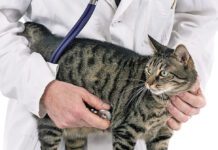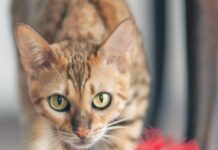Hypertrophic cardiomyopathy (HCM) is a common disease in cats that can cause clots that may result in a potentially life-threatening blockage of blood supply to various parts of the body (most commonly the hind limbs). Clopidogrel (Plavix) is an antithrombotic drug that is commonly prescribed for HCM to decrease the likelihood of clot formation, and the effectiveness of this drug can vary among cats.
A study of 49 cats with HCM showed a varied response to clopidogrel may be the due to a mutation in an enzyme called P2RY1 (an A236G mutation).
After 10 to 14 days of clopidrogel, the researchers found that the blood of cats with this mutation was more likely to clot than that of cats with the unmutated form of P2RY1. Cats with this genetic variant may benefit from additional or different thrombolytic medications. More research needs to be done, but genetic testing of cats being considered for clopidogrel therapy may help predict their response.n
Ueda, Y., et al. A genetic polymorphism in P2RY1 impacts response to clopidogrel in cats with hypertrophic cardiomyopathy. Sci Rep 11, 12522.




